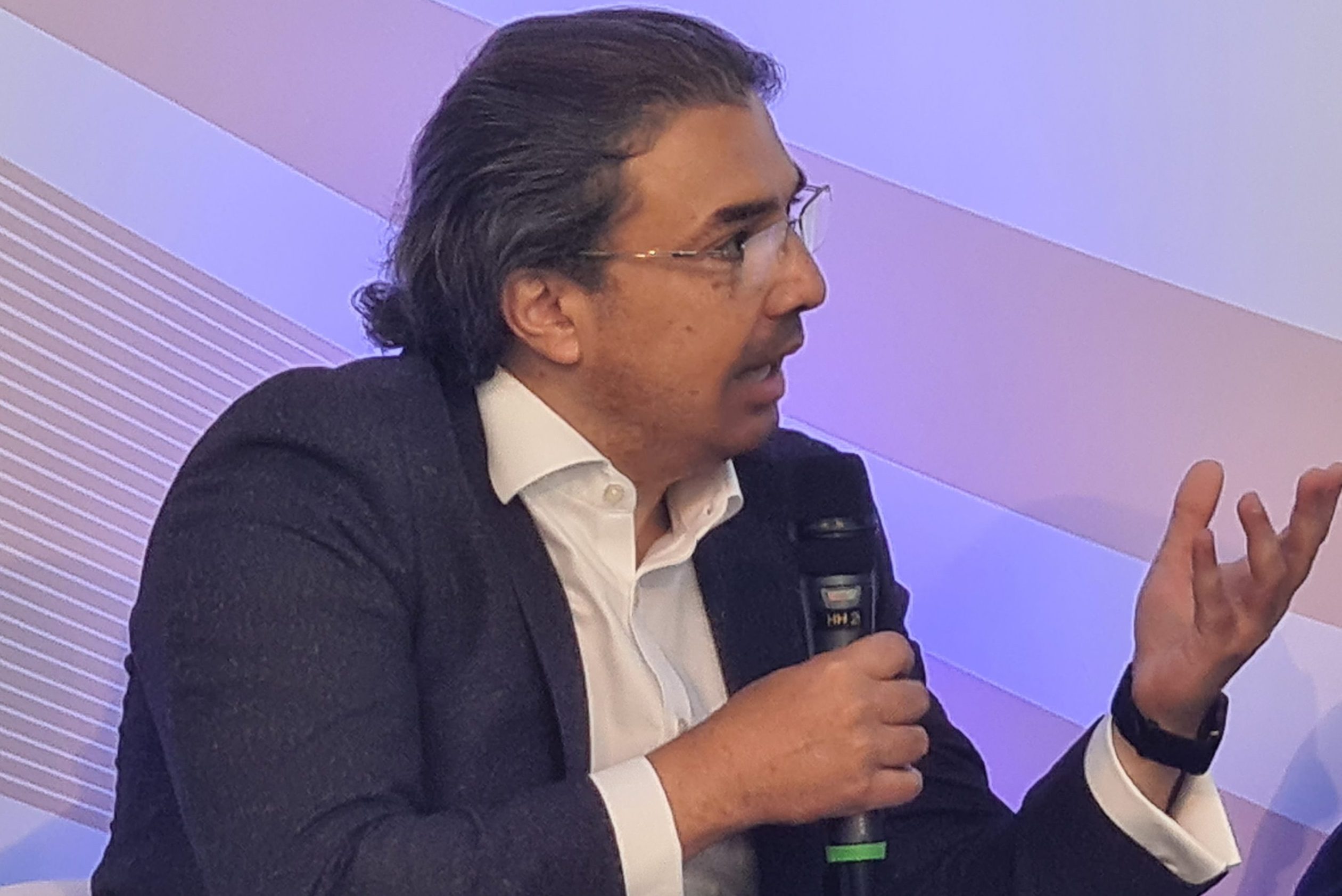
At the Connected Britain conference in London’s Business Design Centre, Ahmed Essam, Vodafone’s UK CEO, shared his views with fellow panellists and delegates from the tech comms world on a range of topics, from net neutrality to market consolidation, regulation to the importance of 5G.
The main themes under discussion on the first day of the Connected Britain conference in London’s Business Design Centre were the shift to 5G in mobile and the shift to fibre in fixed-line broadband.
Both of these developments require significant investment in a highly competitive market where there is intense pressure on profit margins – one of the main challenges facing the technology communications sector.
In a “fireside chat” with Bloomberg reporter Tom Seal, Ahmed reflected on where his company stood in a market still reverberating from the impact of the £31bn merger of O2 with Virgin Media.
Ahmed, who took over the role of CEO in February 2021, said Vodafone was well-positioned as an “agile challenger” unencumbered by legacy networks, free to partner with the best fibre providers and other technology partners to drive Gigabit Britain and offer “the very best connectivity” to customers.
Not only was Vodafone able to cope with the pandemic, he said, it actually grew the business and maintained its position as the fastest-growing broadband provider over the last two years.
But he conceded that further consolidation in the market was a possibility in such a competitive market where “we have to fight every day to win customers”.
“If you want to accelerate and translate investment and drive returns that would really improve the infrastructure this [merger] is one lever,” he said. But he also emphasised the importance of regulatory reform to encourage further investment in network infrastructure.
“I think what the UK needs is a pro-investment environment,” he said. “We’re really in the best position to lead the way in 5G and digital.”
Purpose-driven business
As well as striving to offer the best products and services to customers, Ahmed said he was equally passionate about tackling the digital divide.
“We truly believe we’re a purpose-driven business,” he said.

Credits: MATT WALL
One of the most important learnings from the pandemic was that many people in the UK “still suffer from digital poverty”, he said, which is why Vodafone is committed to connecting one million disadvantaged people through its Buy One Give One scheme in partnership with The Trussell Trust.
The power of 5G
The fireside chat later broadened into a panel discussion featuring Ahmed; Lutz Schuler, CEO of Virgin Media O2; Howard Watson, Group Chief Technology Officer, BT; and Karen Egan, Senior Telecoms Analyst, Enders Analysis.
The panellists were encouraged by the strong take-up of 5G and fibre broadband as they roll-out across the UK.
“What 5G delivers is of great significance,” said Ahmed. “Our report shows that it can bring £150bn to the economy over the next 10 years, and £6bn to the manufacturing sector in buying efficiency.”
Vodafone’s mobile private networks and 5G standalone have been helping improve factory production lines in particular, he said, and enabling greater efficiency in the public sector, too. It’s not just about data download speeds, he argued, but also about the capacity, low latency and security 5G can offer business. And Vodafone’s partnership with Amazon Web Services has also brought edge computing capability to businesses, he added, further enabling efficiency improvements.
Convergence of opinion
There was much discussion about convergence – bringing mobile, broadband and other services together into one package – and all agreed this was the future. But Ahmed pointed out that you can have all the speed you like coming into the home, but without decent WiFi to handle it, “who cares?”
This is why Vodafone’s Pro Broadband product, promising unbreakable broadband – with mobile connectivity back-up – in every corner of the home, is so important, he said. Customers want seamless connectivity whatever the underlying technology.
Net neutrality
The discussion also turned to net neutrality – the long-held principle that internet service providers should enable access to all content and applications whatever their source, without favouring or blocking particular products or websites.
Some argue that this principle no longer applies in the era of on-demand video which sees just a few content providers often accounting for 70% or more of the entire data traffic telcos deliver to their customers.
Ahmed argued that the net neutrality rule seemed to discriminate against 5G and prevent some valuable use cases, such as network slicing, which was preventing companies from differentiating their services from those of their competitors.
“I really welcome the call for revising net neutrality today,” he said.
Too many builders?
Panel host Tom Seal wondered about the risk of “overbuilding” in the rush to create full-fibre Gigabit Britain, particularly given the rise of new “alternative networks” or “alt-nets” that have sprung up to supply local, underserved areas.
Some analysts believe this is leading to unnecessary duplication and inefficient use of investment resources.
“Our concern is that many investors could turn out to be disappointed when the hoped-for returns aren’t there,” said Karen Egan, Senior Telecoms Analyst at Enders Analysis. And things could get “messy”, she said, if some of those alt-nets went bust, leaving behind infrastructure that may not be easily usable by other providers.
Ahmed thought it “amazing” that we have this much overbuild in some parts of the country when some rural areas have only one provider or none at all. This is where 5G has a role to play, he argued, delivering “last-mile access” to people’s homes and businesses in a more cost-effective way than laying fibre cable.
Ahmed concluded that he was hoping regulator Ofcom would adopt a pro-investment approach to policy in the mobile market as it had in the recent fixed-line market review. Because all consumers care about is high-speed internet access, whichever way it is delivered, he argued.
Gigabit Britain is coming but the debate continues over how the nation should pay for it and how much competition and regulation is needed to ensure a good deal for customers while giving network providers a strong incentive to continue investing.
Stay up-to-date with the very latest news from Vodafone by following us on Twitter and signing up for News Centre website notifications.









